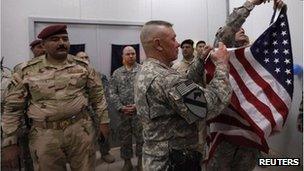The drawbacks of the US Iraq withdrawal
- Published
- comments

Some feel the rush to pull US troops out of Iraq will have long term consequences
President Barack Obama is to visit a military base here in North Carolina to thank the troops for their service in Iraq, and make a historic declaration: The war is over, and in a few days' time the bases will be gone - no troops will remain.
The end has come sooner than many imagined., external The US military and the Iraqi government failed to negotiate an agreement, external which would allow thousands of US troops to remain. I imagine the president is not heartbroken by this failure. It means he can make a clear announcement well before next year's election.
President Obama said this week that it will be for history to judge the decision to go to war. But how do the architects of war feel now?
I have been speaking to Doug Feith,, external who was undersecretary for defence policy at the time and seen as a leading neo con. Like many who backed the war, he points out that a brutal dictator has gone, Iraq is a democracy and may have a brighter future.
But he worries that the pullout has come too quickly.
"I think it is a particularly risky course. What the Obama administration has done is a adopt the high-risk option. I think the country would have a greater chance for the political institutions to develop and the quality of the security forces to improve if the US forces had been maintained at an appropriate level," he says.
"But Obama came in with a commitment, a determination, to leave, and that has caused a lot of problems.
"He made it clear early on that when he thought about Iraq, his thought was not to accomplish anything particular on the ground, his thought was to get out. He communicated that over and over again. And I think that had an ill effect on the thinking of a lot of people in Iraq."
Mr Feith is critical of Mr Obama's whole approach to foreign policy, but does admit that the failures of the Iraq war have dampened America's enthusiasm for the muscular diplomacy he favours.
"The fact that the war didn't go well after Saddam got removed has made Americans, at least for the time being, more reluctant to consider military action and depending on one's view, that is something that will make the world better or more dangerous."
He says the turmoil and early failure of the occupation weakened America's clout.
"In the immediate aftermath of Saddam's overthrow our diplomacy was more potent, more persuasive. The Iranian government saw that the government to the left of them had been overthrown, the government to the right of them had been overthrown and they were nervous. They immediately started some negotiations.
"Once the war didn't go well in Iraq and they realised there was no credible military threat, their position in negotiations hardened and they became completely uncooperative."
I put it to him that it is ironic that neo cons, who believe American power can be used to change the world for the better, made that less likely because of their enthusiasm for the Iraq war.
"I don't think it is ironic, it is the way things go. If one launches a military action and it goes well, it builds up the strength of one's diplomacy. If it doesn't go well, as in Iraq, it is dangerous and it can have very bad consequences."
That's the view from a former member of the Bush administration. I will be reporting, here and on Twitter, not to mention radio and TV, on the president's speech later on Wednesday.
- Published23 November 2011
- Published5 February 2011